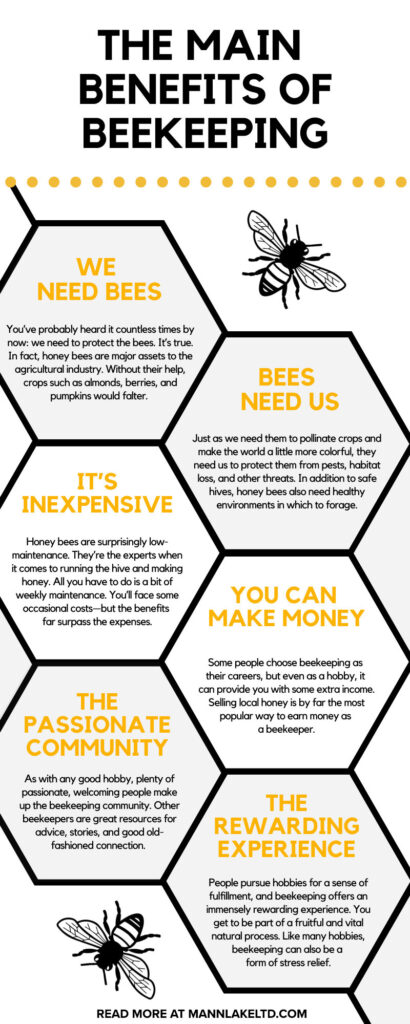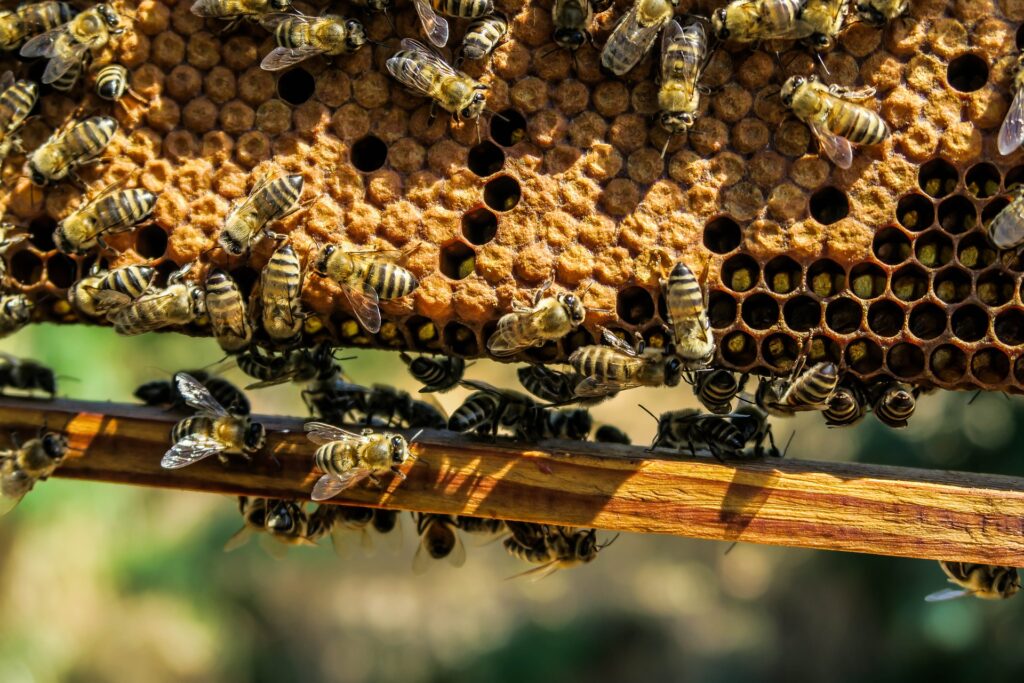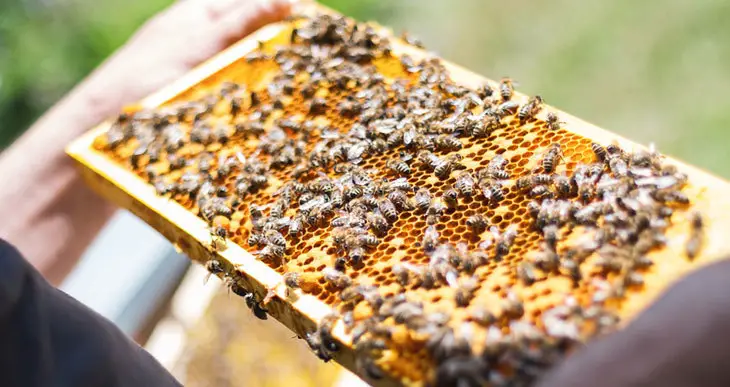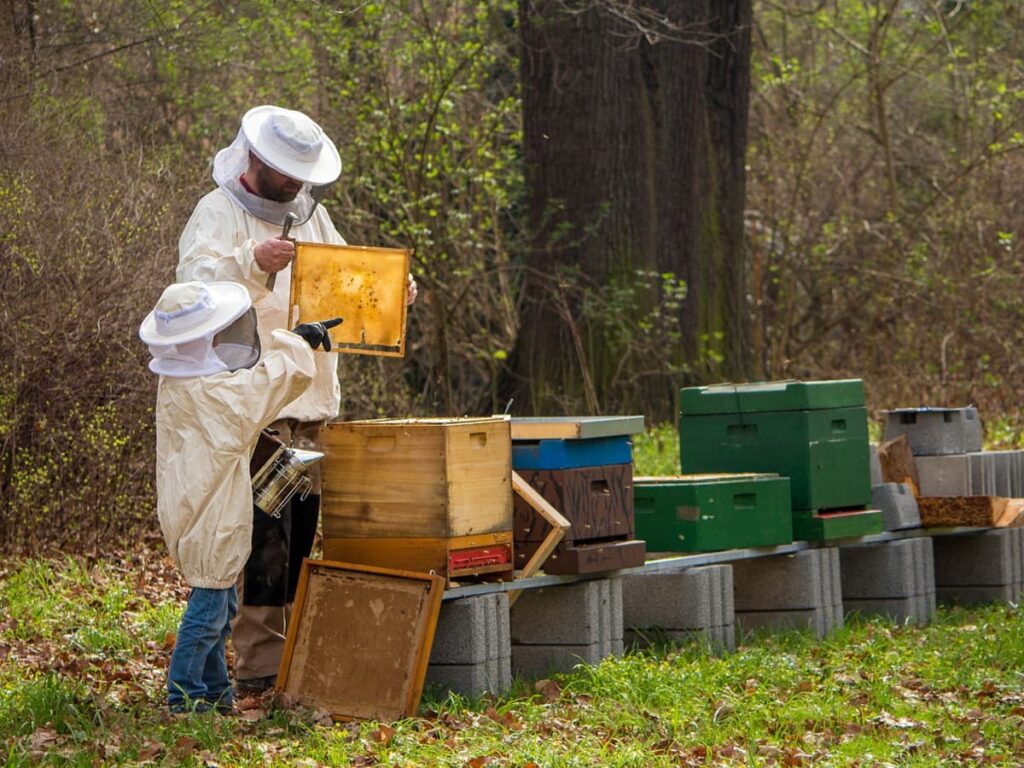
If you’ve ever wondered about the wonders of beekeeping, you’re in for a treat. Discovering the benefits of beekeeping goes far beyond the sweet reward of honey. From supporting bee populations to reaping the health benefits of honey and beeswax, engaging in this rewarding hobby can bring a world of advantages to your life. So, grab your beekeeper’s suit and get ready to explore the fascinating world of beekeeping!
Increased Honey Production
Beekeeping offers several advantages when it comes to honey production. First and foremost, it allows you to significantly increase the amount of honey you can harvest. By providing a suitable habitat and proper care for your honey bees, you can create an environment that encourages them to thrive and produce more honey. This means you can enjoy a larger supply of delicious, golden honey to enjoy or sell.
Additionally, beekeeping gives you the ability to control the quality and purity of the honey you harvest. By maintaining healthy and thriving honey bee colonies, you can ensure that the honey produced is free from contaminants and adulteration. This provides you with pure, natural honey that is not only incredibly flavorful but also allows you to confidently share it with others, knowing that it has been produced under your care and supervision.
Another exciting benefit of beekeeping is the opportunity to produce different floral varieties of honey. Honey bees gather nectar from various flowers, and the type of flowers visited will determine the flavor and aroma of the honey. As a beekeeper, you can strategically position your hives near specific plants or cultivate certain types of flowers to produce unique and distinctive varieties of honey. This opens up a whole world of exploration and experimentation, as you can discover the subtle and nuanced flavors that different flowers bring to your honey.
Pollination Services
One of the greatest contributions of beekeeping is the positive impact it has on crop yield. Honey bees play a vital role in pollinating a wide variety of fruits, vegetables, and flowers. By keeping beehives on your property or supporting local beekeepers, you are helping to ensure that these essential pollinators are present to fulfill their crucial role in plant reproduction. The increased presence of honey bees leads to improved pollination, which directly translates to higher crop yields.
Furthermore, honey bee pollination not only increases the quantity of fruits and vegetables but also enhances their quality. When crops are effectively pollinated by bees, they tend to produce larger, more uniform, and visually appealing fruits and vegetables. This improves their marketability and overall desirability. Additionally, properly pollinated plants often exhibit improved flavor profiles and increased nutritional value. So not only do bees boost the quantity of your harvest, but they also enhance the taste and nutritional benefits of your homegrown produce.
In addition to benefiting crop production, beekeeping also plays a significant role in enhancing biodiversity. Honey bees are not selective in their foraging habits, visiting a wide range of plants, trees, and flowers in their search for nectar and pollen. As they move from one location to another, they inadvertently cross-pollinate different plant species. This cross-pollination helps to maintain genetic diversity within plant populations, supporting the growth and survival of various species. By beekeeping, you are actively contributing to the preservation and protection of plant and animal species in your local ecosystem.
Apart from promoting biodiversity, beekeeping also contributes to the conservation of natural habitats. When you establish and maintain beehives, you are creating and preserving a habitat for honey bees. Bees rely on diverse environments to provide them with the varied food sources they need for their survival. By managing your bees and providing them with a suitable habitat, you are helping to conserve natural ecosystems. This is especially important in today’s world, where environmental degradation and habitat loss pose significant threats to the survival of many species.

Economic Benefits
Beekeeping offers several economic benefits, making it an attractive endeavor for individuals, local communities, and rural economies. One of the primary economic advantages of beekeeping is the generation of income through honey sales. Honey is a highly sought-after product, and there is a constant demand for its unique and natural sweetness. By producing honey through beekeeping, you have the opportunity to sell your harvest, either directly to consumers or through local markets, retailers, or online platforms. This can provide you with a reliable source of income and a way to turn your passion for bees into a profitable venture.
Moreover, beekeeping creates job opportunities, particularly in local and rural areas. As the demand for honey and other bee products increases, the need for beekeepers, apiary workers, honey processors, and marketers also grows. This creates employment opportunities for individuals who may be looking for work or seeking an alternative livelihood. By engaging in beekeeping, you not only contribute to your own financial well-being but also support the creation of jobs within your community or region.
Another avenue of economic benefit in beekeeping is the potential for profit from value-added bee products. Honey is just one of the many valuable products that bees provide. Other bee products, such as beeswax, propolis, and royal jelly, have a range of uses and applications. Beeswax can be used in candles, cosmetics, and furniture polish, while propolis has antimicrobial properties and is utilized in various health and skincare products. Royal jelly, a nutrient-rich substance produced by bees, is used in dietary supplements and beauty products. By harnessing these value-added bee products, you can diversify your income streams and tap into different consumer markets, thereby increasing your economic opportunities.
Furthermore, beekeeping has the potential to boost local and rural economies. As the beekeeping industry grows, it attracts attention from tourists, researchers, and bee enthusiasts from all over the world. This influx of visitors can stimulate local businesses and contribute to the overall economic development of an area. Tourists may be interested in visiting honey farms, participating in beekeeping workshops, or purchasing locally produced honey and bee products. This tourism, combined with the economic benefits generated by honey sales, job creation, and value-added products, can help revitalize and strengthen local and rural economies.
Environmental Benefits
The environmental benefits of beekeeping are vast and far-reaching, making it a significant contributor to ecosystem health and sustainability. Firstly, beekeeping actively contributes to the overall health of ecosystems by promoting pollination. Honey bees, as they forage for nectar and pollen, inadvertently transfer and distribute pollen grains between plants. This cross-pollination ensures the reproduction and continued survival of various plant species, including those that provide crucial resources and habitats for other animals. In this way, beekeeping plays a crucial role in maintaining the delicate balance and harmony of ecosystems.
Additionally, beekeeping aids in the preservation of plant and animal species. In recent years, many pollinator populations, including honey bees, have been declining due to various factors such as habitat loss, pesticide use, and climate change. By engaging in beekeeping, you actively contribute to the conservation of honey bee populations. By providing suitable habitats, practicing sustainable beekeeping techniques, and promoting bee-friendly environments, you create spaces where bees can thrive and flourish. This not only supports the survival of honey bees but also helps preserve other plant and animal species that rely on bees for pollination.
Furthermore, beekeeping improves soil fertility through increased pollination. As bees move from flower to flower, they inadvertently aid in the transfer of pollen, resulting in more successful fertilization and seed production. This process leads to the growth and development of healthy and productive plants, which, in turn, contribute to the improvement of soil fertility. Healthy soils are the building blocks of sustainable agriculture and have a positive impact on crop productivity and ecosystem resilience. By promoting healthy soils through beekeeping, you are indirectly fostering the long-term sustainability and health of the environment.
Lastly, beekeeping reduces dependence on chemical pesticides in agricultural practices. Honey bees are an effective and natural form of pest control. As they forage for nectar and pollen, they inadvertently collect and distribute pest insects, such as mites, that can harm crops. By actively promoting honey bee populations, you create a natural defense system against these pests, reducing the need for chemical pesticides. This not only minimizes the harmful effects of pesticides on the environment but also helps protect the health of the bees themselves. Engaging in beekeeping thus aligns with sustainable and environmentally friendly practices, reducing the negative impacts of conventional agriculture on ecosystems.

Educational Opportunities
Beekeeping offers a wealth of educational opportunities, allowing individuals of all ages to learn about bee biology, behavior, and the importance of pollinators. By engaging in beekeeping, you embark on a lifelong journey of discovery and learning. You have the opportunity to observe bees up close, learn about their complex social structures, and gain insights into their fascinating behavior. This firsthand experience with bees provides a deep and intimate understanding of their role in the natural world and how they contribute to our lives.
Moreover, beekeeping serves as an excellent platform for teaching sustainability and environmental stewardship. By involving children or students in the process of beekeeping, you impart invaluable lessons about the interconnectivity of ecosystems and the importance of preserving and protecting our natural environment. Beekeeping integrates science, biology, and environmental studies, allowing for hands-on and experiential learning that sparks curiosity and nurtures a love for nature. Whether it is in a school setting, a community garden, or your own backyard, beekeeping provides immense opportunities for fostering a sense of environmental responsibility and promoting sustainable practices.
Health Benefits
In addition to the various environmental and economic benefits, beekeeping also offers several advantages for personal health and well-being. Natural and organic honey produced through beekeeping can serve as a healthy alternative to conventional sweeteners. Honey is a natural source of energy, rich in antioxidants, vitamins, and minerals. By substituting processed sugars with honey, you can enjoy a reduced glycemic impact and potentially experience improved digestion and overall well-being. Honey’s natural properties also make it an excellent choice for soothing sore throats and relieving coughs. By incorporating honey into your diet, you can harness its potential health benefits and contribute to a healthier lifestyle.
Furthermore, bee products such as propolis and royal jelly have been recognized for their potential medicinal properties. Propolis, a mixture of plant resins and bee secretions, is known for its antimicrobial and anti-inflammatory properties. It has been used for centuries to heal wounds, alleviate mouth and throat infections, and support immune function. Royal jelly, produced by honey bee workers, is a nutrient-rich substance often associated with longevity and vitality. It contains essential amino acids, vitamins, and minerals that have been linked to potential health benefits. By keeping bees and utilizing propolis and royal jelly, you gain access to these natural remedies and explore their potential therapeutic uses.
Beekeeping also offers personal enjoyment and a deep connection with nature. As you embark on this journey as a beekeeper, you develop a profound appreciation for the intricate and fascinating life of bees. The daily interactions with your bees, the observation of their behaviors and social dynamics, and the marvel of seeing them work together as a complex and harmonious society are incredibly rewarding experiences. Beekeeping allows you to slow down, immerse yourself in nature, and find solace in the peaceful rhythm of the hive. This connection with nature and the therapeutic nature of beekeeping activities can provide a much-needed respite from the stresses of everyday life, contributing to your overall well-being.

Community Building
Beekeeping brings people together through a shared interest and creates opportunities for collaboration and knowledge exchange. In the beekeeping community, there is a sense of camaraderie and a willingness to support and help one another. Beekeepers often come together to share their experiences, insights, and challenges, creating a network of support and camaraderie. Whether it is attending local beekeeping association meetings, participating in workshops, or simply engaging in conversations with fellow beekeepers, being part of a community helps to deepen your knowledge, hone your skills, and build lasting friendships.
Moreover, beekeeping offers opportunities for collaboration and knowledge exchange within the community. As a beekeeper, you can actively contribute to the collective knowledge and understanding of bees and their management. By sharing your experiences, successes, and failures, you help others learn and grow in their own beekeeping endeavors. Collaboration within the beekeeping community can lead to the development of innovative techniques, improved beekeeping methods, and the advancement of sustainable practices. Through this collective effort, beekeepers can make a significant impact on local ecosystems, promote the well-being of honey bees, and engage in meaningful conservation efforts.
Additionally, beekeeping can bring about community-level initiatives and projects that extend beyond individual apiaries. Local communities often come together to establish bee-friendly environments in public spaces, parks, or community gardens. These initiatives not only create welcoming habitats for honey bees but also serve as educational opportunities for the community. By engaging in these collaborative projects, you help foster a sense of environmental responsibility and resilience within your community. And through collective efforts, a stronger and more connected community can be built, contributing to the overall well-being and prosperity of the locality.
Contributing to Conservation
Engaging in beekeeping allows you to make a meaningful contribution to the conservation and protection of honey bees and their habitats. Honey bees, as well as many other pollinators, are facing numerous threats, including habitat loss, pesticide use, pests, diseases, and climate change. By establishing and maintaining healthy honey bee colonies, you are actively supporting the survival and preservation of these essential pollinators.
Furthermore, engaging in beekeeping can contribute to research and studies on pollinators. By monitoring the health and behavior of your bees, sharing data, and participating in citizen science initiatives, you become a valuable resource for researchers and scientists studying the dynamics and challenges faced by honey bees. Your observations and experiences can provide insights into the impacts of environmental factors, the effectiveness of conservation efforts, and the overall health of honey bee populations. By actively contributing to research, you help shape the understanding and conservation strategies for pollinators, ensuring their long-term survival and well-being.
Moreover, beekeeping facilitates the protection and restoration of habitats for bees. By providing suitable locations for your beehives, planting bee-friendly flowers and trees, and promoting sustainable land management practices, you create safe havens for honey bees to flourish. This habitat creation and restoration contribute to the overall health of ecosystems and support the survival of other plant and animal species that rely on bees for pollination. Through these efforts, you actively participate in the restoration of natural habitats, the preservation of biodiversity, and the conservation of environmental resources.

Personal Growth and Learning
Beekeeping offers personal growth opportunities that extend beyond acquiring knowledge and skills about bees. By engaging in this rewarding hobby, you develop a range of valuable qualities, including patience, observation skills, and an understanding of the interconnectedness of ecosystems.
Beekeeping requires patience, as honey bees operate on their own timeline and cannot be rushed or forced into certain behaviors. They follow their instincts and operate within the confines of their natural rhythms and biological processes. As a beekeeper, you learn to be patient, observant, and mindful of the natural processes and cycles that govern the lives of bees. This cultivated patience can extend beyond the beekeeping realm, positively impacting various aspects of your life.
Moreover, beekeeping sharpens your observation skills. To effectively manage your bees and ensure their well-being, you must closely observe their behavior, their interactions with each other, and their responses to different environmental factors. This keen sense of observation helps you understand and address potential issues or challenges early on, ensuring that your bees remain healthy and productive. The habit of keen observation can be extended to other areas of your life, assisting you in making informed decisions and being more attentive to your surroundings.
Finally, beekeeping fosters an understanding of the interconnectedness of ecosystems. As you engage in this hobby, you gain a deeper appreciation for the delicate balance and interrelatedness of the natural world. You come to realize that the health and well-being of honey bees are intricately connected to the well-being of other plants, animals, and even humans. This understanding promotes a holistic and interconnected perspective that can translate into various areas of your life, fostering a sense of environmental stewardship and sustainable living.
In conclusion, beekeeping offers a multitude of benefits that extend beyond the mere production of honey. From increased honey yields and the ability to produce different floral varieties of honey to contributing to pollination services and environmental conservation, beekeeping plays a vital role in ecosystem health, economic growth, personal well-being, and community building. By engaging in this rewarding and fascinating endeavor, you embark on a journey that brings joy, knowledge, and a deep sense of connection with nature. So why not grab a bee suit, put on your gloves, and start your beekeeping adventure today? The bees are waiting to share their incredible world with you!